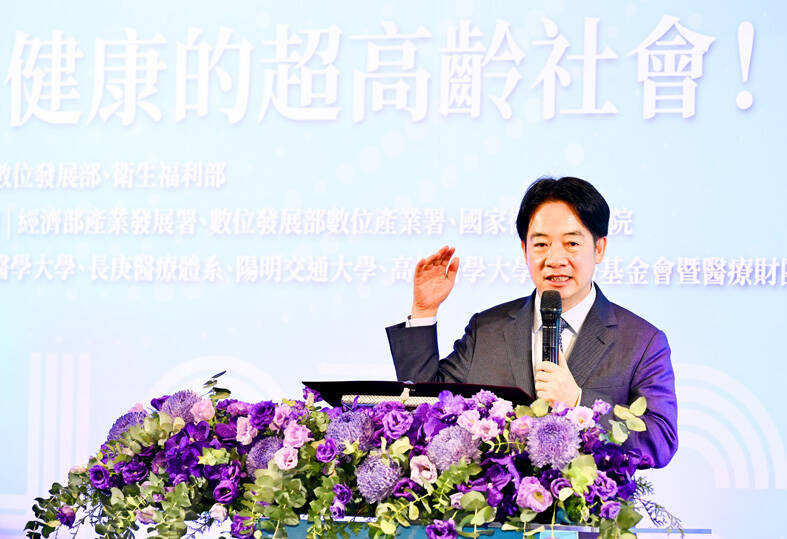President William Lai (賴清德) at a tech expo about healthy aging on Friday praised Taiwan’s strengths in healthcare and technology for being able to provide a new economic opportunity.
Lai said Taiwan can make good use of its competitiveness in the technology and healthcare services sectors to “create a new industrial path” and serve as an experimental market for international innovative technology.
“Taiwan’s life expectancy is about 80 or so years old, but records show that the average Taiwanese spend about one-tenth of their lives, or eight years, requiring care for health issues,” he said.

Photo: Lo Pei-de, Taipei Times
A former physician himself, Lai said one of his presidential campaign promises was a “healthy Taiwan,” aimed at promoting good health for the public and making healthcare technology one of the country’s strengths.
Companies and research institutes participating in the expo are showcasing their new services and products utilizing digital technologies.
The Industrial Technology Research Institute, for example, had a care solution which uses image recognition technology to distinguish changes in an older person’s movements and cognitive behavior.
There were also information and communication technology (ICT) companies with artificial intelligence (AI)-related exhibits, such as Acer using AI to evaluate a person’s risk of osteoporosis and Compal detecting possible depression and dementia with the technology.
Taiwan would become a super-aged society by next year, meaning that more than 4.68 million, or 20 percent of its population, would be aged 65 or older, Institute for Biotechnology and Medicine Industry adviser Shen Jong-chin (沈榮津) said.
An estimated 35 percent of the labor force (under the age of 65) would have to quit their jobs to take care of their aged family members, he said.
It is therefore urgent for Taiwan to develop a health industry founded on technology to meet the challenge and serve the “silver economy,” Shen said, referring to markets catering to the needs of older people.
Such an industry could also support the ministry’s policy to attract foreign tourists, including those coming for medical tourism, especially from neighboring countries such as Japan, South Korea and other Southeast Asian nations, Minister of Economic Affairs J.W. Kuo (郭智輝) said.
Taiwan can leverage its advantages in AI and ICT to build a health industry ecosystem encompassing dietary management, sports management, prognosis and rehabilitation, Kuo said.
The expo is taking place until today at the Taipei World Trade Center’s Exhibition Hall 1.

An essay competition jointly organized by a local writing society and a publisher affiliated with the Chinese Communist Party (CCP) might have contravened the Act Governing Relations Between the People of the Taiwan Area and the Mainland Area (臺灣地區與大陸地區人民關係條例), the Mainland Affairs Council (MAC) said on Thursday. “In this case, the partner organization is clearly an agency under the CCP’s Fujian Provincial Committee,” MAC Deputy Minister and spokesperson Liang Wen-chieh (梁文傑) said at a news briefing in Taipei. “It also involves bringing Taiwanese students to China with all-expenses-paid arrangements to attend award ceremonies and camps,” Liang said. Those two “characteristics” are typically sufficient

A magnitude 5.9 earthquake that struck about 33km off the coast of Hualien City was the "main shock" in a series of quakes in the area, with aftershocks expected over the next three days, the Central Weather Administration (CWA) said yesterday. Prior to the magnitude 5.9 quake shaking most of Taiwan at 6:53pm yesterday, six other earthquakes stronger than a magnitude of 4, starting with a magnitude 5.5 quake at 6:09pm, occurred in the area. CWA Seismological Center Director Wu Chien-fu (吳健富) confirmed that the quakes were all part of the same series and that the magnitude 5.5 temblor was

The brilliant blue waters, thick foliage and bucolic atmosphere on this seemingly idyllic archipelago deep in the Pacific Ocean belie the key role it now plays in a titanic geopolitical struggle. Palau is again on the front line as China, and the US and its allies prepare their forces in an intensifying contest for control over the Asia-Pacific region. The democratic nation of just 17,000 people hosts US-controlled airstrips and soon-to-be-completed radar installations that the US military describes as “critical” to monitoring vast swathes of water and airspace. It is also a key piece of the second island chain, a string of

The Central Weather Administration has issued a heat alert for southeastern Taiwan, warning of temperatures as high as 36°C today, while alerting some coastal areas of strong winds later in the day. Kaohsiung’s Neimen District (內門) and Pingtung County’s Neipu Township (內埔) are under an orange heat alert, which warns of temperatures as high as 36°C for three consecutive days, the CWA said, citing southwest winds. The heat would also extend to Tainan’s Nansi (楠西) and Yujing (玉井) districts, as well as Pingtung’s Gaoshu (高樹), Yanpu (鹽埔) and Majia (瑪家) townships, it said, forecasting highs of up to 36°C in those areas